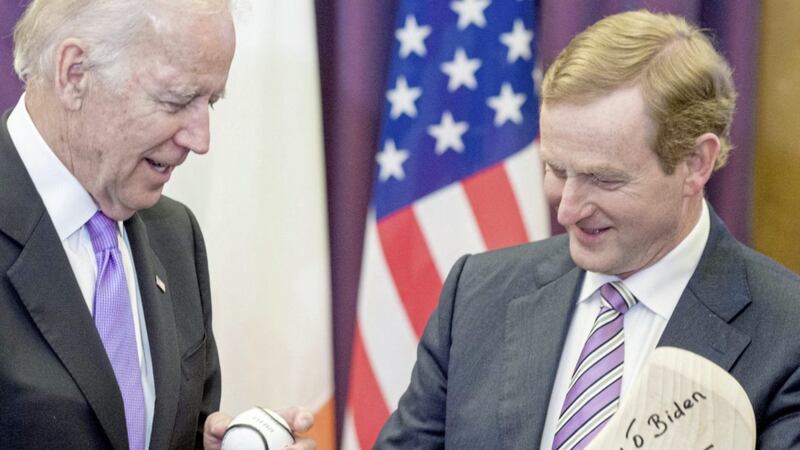IT puzzles some observers as to why US Presidents take such a keen interest in Northern Ireland, which has a population slightly larger than Phoenix, Arizona and is outnumbered by California at more than 20 to one.
The intervention by President Joseph Biden in the dispute over the post-Brexit protocol is the most recent example.
We are told that, in the course of a “candid discussion” with the British Prime Minister at the G7 summit in Cornwall, the President urged Boris Johnson to make sure that the peace process was protected from harm in the row over checks on the so-called “sea border” between Britain and the north.
The family connection is of course a factor and Irish ancestry has been claimed by or on behalf of almost half of those who have held the office of President.
One of Biden’s great-great grandfathers, Patrick Blewitt from Ballina, Co Mayo, left for the US in 1850 and settled in Scranton, Pennsylvania.
His other great-great grandfather, Owen Finnegan, came from the Cooley Peninsula in Co Louth and moved to America in the late 1840s, settling in Seneca, New York.
We are told that, thanks to the the Finnegan connection, Biden is a distant cousin of Ireland rugby internationals Rob and Dave Kearney.
Some of his White House predecessors who did not have such strong family roots here still took a great interest in Irish affairs.
Bill Clinton was of course a key player in the moves that led up to the Good Friday pact.
Jimmy Carter made a major intervention in August 1977 when he issued a statement in which he called, in effect, for a power-sharing government as part of a solution that would have the support of the British and Irish governments.
Ronald Reagan had considerable influence with Margaret Thatcher, although it is not widely known that, every time he had a meeting with the Iron Lady, Ireland was on the agenda.
Reagan helped to persuade Thatcher to sign the Anglo-Irish Agreement of 1985 which gave the government in Dublin a consultative role in the administration of Northern Ireland for the first time, with Irish civil servants on the ground in Belfast as official observers.
That particular development did not, of course, please the late Ian Paisley senior and inspired his famous “Never, never, never!” declaration.
Like his father before him, Ian Paisley jnr is not one for mincing his words, as was seen in his comment “that crowd at Stormont... couldn’t run a bath”, when he criticised what he saw as political incompetence in relation to the rules for events such as the cancelled Van Morrison concerts in the Europa Hotel.
Then there was his rather startling duet on stage with Sir Van Morrison in which health minister Robin Swann was described as “very dangerous”.
This was clearly Morrison’s response to Mr Swann’s article in Rolling Stone magazine where he criticised Sir Van’s opposition to coronavirus restrictions and wrote: “Some of what he is saying is actually dangerous.”
DUP leader Edwin Poots has said that Mr Paisley subsequently apologised to the minister.
Those of us who are lifelong Van Morrison fans but also recognise the necessity for lockdown are divided in our sympathies: it must be a very frustrating time for the music legend, but the public health authorities and politicians also need strong support and understanding in current circumstances, although a little more clarity at times would be very helpful.
The near-disappearance of live “in-the-room” concerts is unavoidable but exasperating.
Mind you, Arlene Foster did her best to keep us entertained when she sang part of the Frank Sinatra number That’s Life, written by Dean Kay and Kelly Gordon, at the British-Irish Council press conference in Fermanagh.
Who knew the outgoing First Minister had such a good singing voice?
Her brief performance compared favourably with Ol’ Blue Eyes himself, whom I saw and heard in person at a Dublin concert in 1991.
Pointing out last week that she is 50 years of age, she said that “now is a good time to have a change”.
There has been speculation that she could be destined for the House of Lords, where she might feel a little out of place since the average age as of February 2019 was 70 years.
However, she could keep their lordships and the rest of us entertained with versions of other numbers associated with Sinatra, such as You Make Me Feel So Young.








